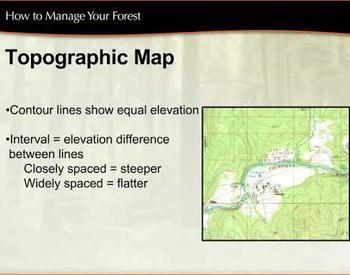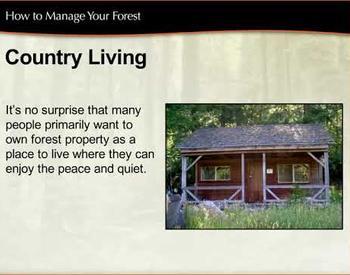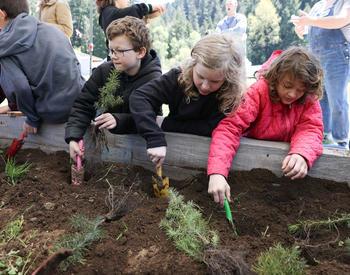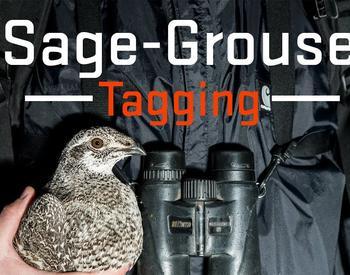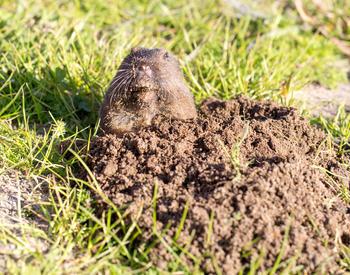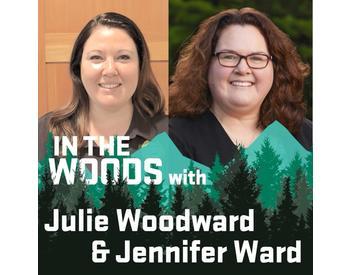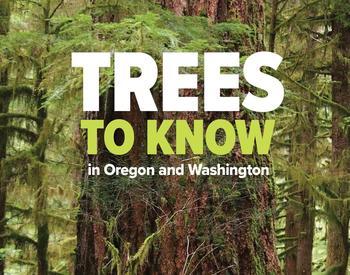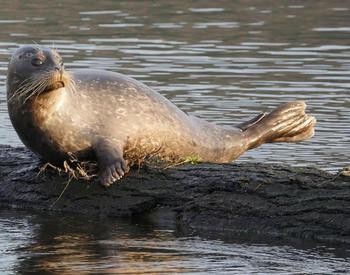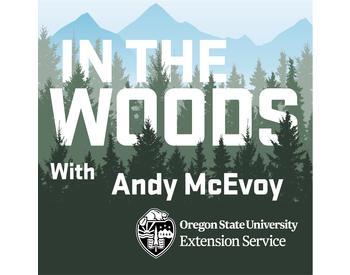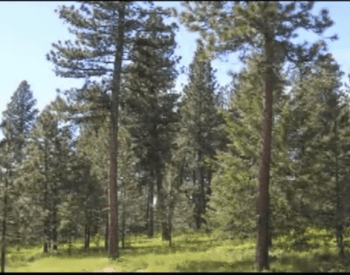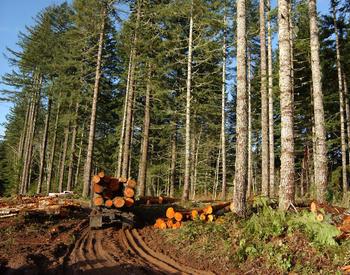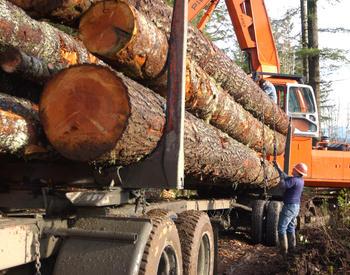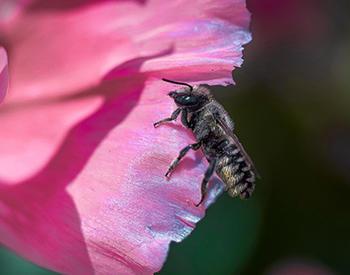Transcript
From the Oregon State University's extension service, you are listening to In The Woods with the Forestry and Natural Resources Program. This podcast aims to show the voices of researchers, land managers, and members of the public interested in telling the story of how woodlands provide more than just trees. They provide interconnectedness that is essential to your daily life. Stick around to discover a new topic related to forests on each episode. Welcome back to another episode of In The Woods, I'm your host Lauren Grand, assistant professor of practice and extension agent in Oregon State University's College of Forestry. Today's topic is dealing with difficult situations. Our guest today is Emily Jane Davis. Emily Jane is an associate professor in the department of forest ecosystems and society and a statewide extension specialist in collaborative natural resources management. She's an applied social scientist who studies partnerships and collaboration in natural resources. Welcome to the podcast Emily Jane! Thanks Lauren, I'm really glad to be here today. So, I want to get started by asking you sort of an overview question. What does it mean to deal with difficult situations in forestry or forced relationships? So, when we think about difficult situations we'll be talking today specifically about those kind of interpersonal situations that that get difficult and that we don't really have training or skills to deal with as normal people. Essentially we'll be talking about how to deal with conflict which is an inevitable part of living in the world with others and it's not something that can always just be totally avoided, but it can also be an opportunity for growth and change. So, if you're listening to this podcast you might be a landowner who has conflict within your family about what how you're going to manage your property in the future or with your neighbor about the risk of wildfire or a fence line or you might be someone who's participating in a group like a watershed council or a forest collaborative and there's different people in the room at those meetings that seem to have different values or views about natural resources. So, all of those are forest environment situations where you might experience conflict. Great, yeah, I talked to a lot of landowners about sometimes having issues with neighbors or families so hopefully this will be a really good resource for them. I hope so, and I'll just throw in a caveat that this is a topic that people go to school for dedicate their careers to you know we have whole books about it whole courses we're just scratching the surface today and we're also facing quite a lot of substantial conflict in our society and in our value systems, so this podcast is not going to fix the world, but it's intended to give you as an individual just a couple tools to start thinking about what conflict is, how you respond to it, and how you might engage more productively so that's kind of what I hope you'll you'll get out of it as a listener. That sounds great, although I feel like we should strive for world peace every day right? I mean that's always, always a good goal Lauren, um, but so I'll you know I'll start by talking a little bit about about conflict because I don't know about you but I never got any training in school. I never took any classes there's just you know it was kind of just something I observed around in my around with family and friends it's just not something we get a lot of resources to deal with, so I'm gonna ask you like when you hear the word conflict what kinds of associations do you have what what other words come up for you with the word conflict? Oh gosh, the first thing that comes to my mind is definitely anxiety, um, yeah, there's you never I just you never want to feel like you're in conflict with someone um things like disagreement and fighting come up or you know like things like not getting what you want, but, um, I also hope like to think that if I'm having a conflict with someone would get some sort of resolution, so the word compromise also comes up for me. What I like about what you just said with how you talk about the what we might think of as the negative aspects of conflict, so the ways that it makes us nervous that we're not sure how to deal with it or the unpleasantness of not of being at odds with another person all those are arguably negative, but then you also mention the possibility for resolution or solutions as well which is kind of the positive side of conflict, but not necessarily one I think we automatically think of right? Oh absolutely, anxiety and nervousness and negative things definitely were at the forefront of my mind when you asked. So, then how do you think you've learned how to deal with conflict in your life and in your career? Have you had any chances to learn how to deal with it? For most of my life, no. More recently in my career I was I've been able to attend some trainings, but definitely had to try to learn on the fly when I was in conflict with someone. That's really challenging because you're nervous, you're kind of in the moment, and you're not as sure what to do, so I understand that conflict is really hard for us to deal with because we're doing that. We're kind of learning on the job, we're learning as we go, and we're often put in situations where we don't have time to plan. We're just we're just stuck reacting and for some of us that's the mode we're more comfortable in than others. And it's hard for us to deal with because of that and because we don't have training or background. So, I think that something that's good to start talking about is, you know, how do we start dealing with conflict? How do we start equipping ourselves to better deal with it? And I think something that you know we we should think about is that we all have different we're all different people we have different styles we have different communication modes, so not all of us are going to deal with conflict in the same ways. And then also not every conflict is the same and so not every conflict is going to lend itself to the same approach. So, I think we, Lauren if you don't mind I'd like to talk a little bit about identifying what I call conflict styles which is really important for a few reasons. It can help you understand how different approaches might or might not work given different situations. And then also knowing what kind of conflict style you have as a person can help you figure out how to work with conflict in ways that are going to draw on your strengths and also what to do when you get into some weaknesses. So, how does that sound to you? That sounds great. Awesome, before we get going into it I think I should I should give a shout out to our awesome uh forestry and natural resources extension colleague Nicole Strong. So, Nicole and I originally worked together to develop that a workshop built around this activity, you know, built around the idea of difficult situations, and how do we deal with conflict as individuals?, and I just wanted to recognize her. And Lauren you've also given this workshop with her before too so shout out to our to our pal Nicole. Yeah, she definitely has taught me a lot about this topic. Yeah, for sure. I think something that's great about it too is how do you bring structure to it right? Instead of it just being oh my gosh conflict what are some concepts we can use to kind of break this down and make it more approachable? And that's what the conflict styles can be about. So, I'll start with one conflict style one of the con ways people deal with conflict is to be accommodating. So, this means they're willing to forego their own interests in favor of others, they might step down on their goals a little bit, and they might do this when it's really important to preserve harmony and avoid disruption. They might realize wow this issue is more important to the other person or people that I'm in this conflict with you know, so I can I can step down a little bit. It's a good approach when you realize that you're wrong um and it's also a good approach when if continuing to compete and have disruption just wouldn't be a good approach to conflict, so you're kind of willing to willing to accommodate the interests of others in a in a um in a conflict. So, Lauren is this a style you feel like you have used some in your work or in your life? Is this a natural style for you? Not to put you on the spot. That's okay, actually while you were talking I was thinking, you know, this is definitely a style that I'm more likely to use in in my personal relationships because I um I don't want to want to fight as much or you know be in conflict as much with with those people that I really care about. And so as you were talking I was thinking well maybe I do give in quite a bit to some of the people I really love. Yeah, but sometimes preserving that harmony is really important when relationships are at stake, so as you're noting this is really important when you when relationships matter and so is a landowner dealing with family issues there may be times when preserving your relationship with the people in your family is somewhat more important or is really important compared to your land management goals. So, this is a good one for when you're trying to protect relationships. Um, but it's not easy right to be accommodating. So, thinking about some of the skills you might need to have to be an accommodating conflict style person, you have to be able to listen to people right you have to be able to hear what they're saying and understand that. You have to be able to understand their concerns so something we call active listening which we'll talk about in a little bit. You have to be able to take the back seat without being afraid about losing your power influence which isn't always easy and so essentially you're accepting that you're not going to win every time you're not always going to have your way. So, those are the things you need to accommodate. And then I think another conflict style that really does this too and that's pretty similar is what we would call a collaborating conflict style. And this is definitely more true when we're talking about a conflict that involves multiple folks not just not just two people having an interpersonal conflict and it's really about trying to find collective solutions that are going to work for everyone it's seeking that ideal win-win outcome. And we tend to want to use this approach when there's a lot of interdependent complex issues going on and we need an integrative solution that's going to try to address them all, and you kind of you want to innovate you want to try something new and you really genuinely want everyone to get something out of it.
Lauren, have you participated in any kind of collaborative meetings or projects or processes in your work?
Yeah, I've participated in quite a few. A lot of meetings where we're trying to do some planning and program development, and, um, it's interesting there's always a lot of voices and a lot of people that have a lot of opinions about things going on and it's hard to sort of make everybody happy. Right, what do you like about that setting? You know, what do you find enjoyable about a collaborative approach? I really enjoy the different voices that are in the room and hearing about the values that each people each person brings and how the decision that we make together can actually be better because we're hearing all those different values and can incorporate them into the decision that we make, and sometimes some really cool things come up, things I never would have been able to think of on my own. That's great, the academic literature agrees with you on that too right these are all the kind of ideal outcomes that we think we're supposed to get from from collaboration as a conflict approach. Okay, but, but it's not always roses, so what's hard for you about it? Be real. What's really hard is, um, it's really difficult to get what you want, right? Um there's usually somebody in the group that is the exact opposite of you or you know is fighting you hard on a situation and, um, you know you might have to find ways to compromise on some of the things that are pretty important to you. So, I think that's one of the one of the difficult things with that type of style. Yes, that's some real talk and it's often hard to have this style as an individual in the room. This is a style though that say a facilitator or a mediator really needs to have, right? If they're the ones helping create a process and make it fair for everyone. So, either as a facilitator or as someone who's trying to practice this conflict style, you really have to be able to understand opposing viewpoints on all sides of an issue which is can be really difficult when someone who whose viewpoint you really don't relate to or is not not your background. Um, how do you get all the issues out on the table without intimidating people or causing them to feel defensive?, how do you look at that information all objectively when it's really value laden?, and then decide what to do with it how do we best how do we best move forward with this. And how do you really see the root cause of a problem? Those are some of the skills we need for a for a collaborative conflict style. So, wow, that one's hard work I guess. Yeah, definitely. So, both collaboration and then the previous one we talked about accommodating those are conflict styles that are really heavy on cooperation and trying to and those are really important when there's relationships at hand. But there are other conflict styles you could use when relationships are less important and other things might be more important to you. So, avoiding might be one that a lot of us are familiar with, right? Because conflict is seen as negative in our society and it makes us anxious, so why not avoid it, right? Oh yeah, definitely do that sometimes. Especially when I don't know the person or you know I'm not dedicated to the situation. Yeah, exactly those are those are some of the conditions under which an avoiding style might actually be appropriate. Um, it's actually it can be a really viable approach when there's going to be no good outcome from engaging, or it's a dangerous situation and there's a variety of ways that you or others might be unsafe. Also, maybe it's you know the issue is insignificant enough that it's not worth the energy the disruption all of that. So, it has some things in common with an accommodating style, right? Uh, you're you're willing to forego your own goals your preferences issues at hand are not as important as preserving harmony or safety, but you just, you know, sometimes there are times when you really you really want to avoid conflict. Another good time to do it is if you actually are going to need more information before taking action or making a decision, so not wading into the conflict without the information or resources that you that you need. So, I was trying to think about sometimes when avoiding conflict when I've done it and when it hasn't worked out for me because sometimes avoiding it is not good and I've had you know situations where I'm working with a partner in a work situation and I realized we don't have the same understanding of what our goals are and we're not working towards the same goals very effectively, but I don't like the tension that's coming up around that so instead of just going to that root issue I just I'm like this is great end the meeting we're done. But over time obviously that doesn't lead to very productive dynamics on a project or in a relationship so by not trying stepping back and saying I think we need to talk about why we're having conflict or what's going on here I was just making the situation worse. I don't know if you've ever gotten into one of those where you realize like I had some short-term gains from avoiding this, but in the long term I should have not avoided it. Yes, oh, yes.
Definitely in similar situations where working on working on projects where you sort of hold things in because you don't want to make it more difficult or cause a conflict at that point and then later on it ended up being something that should have been brought up a lot sooner for example. Yeah, definitely, and then the last conflict style I'm going to talk about today which is not a cooperative conflict style is competing or hard bargaining. So, you're you're in there and you really want to get what you want and you're not going to compromise and you're not going to accommodate. This this would be a situation where perhaps you just really could not compromise on these values they were so important to you it was so critical that you just could not compromise. Um, it often sometimes when there's difficult or unpopular decisions to be made where there really isn't a lot of um a lot of compromise available, or situations that require a quick decision with little time to debate the issues as well. And we kind of tend to think of this I guess this might sound like a negative approach but there are situations when this can work out. But it's not easy to do it's not a complex style that comes naturally to me because you have to be able to know when and how to assert yourself. Um, you have to have like a tenacity to keep pushing forward your case even if you're being attacked by others, you have to be really clear about what your position is and why, and you have to be able to organize and make it make a strong case. So, I would say that I don't see this conflict style a lot in my work, but I don't know about you have you seen this much? Um, yeah, I see it every once in a while mostly with people who aren't often in working in these group projects that I'm working in, so if i'm working one-on-one with someone and they're asking me a specific question about something and they have a passion about it or um, you know, sort of call me when they have an answer to they're asking me a question and they sort of have the answer they want, but I give them a different answer is uh usually when I have this this style sort of comes up for me a lot if that makes sense.
It makes total sense and I think I spend a lot of my time in this collaboration space where everyone's already primed and wanting to be on their best collaborative behavior so maybe that's why I see it less. So, those were the those were some different conflict styles and I think you as a listener might reflect a little bit. You know, which one do I find myself using the most?, how do I know how do I know it when I see it?, and do I think it's the right one for the situation I'm in? I think that's the key take home here is that it's not that one of these is necessarily always better than the other, but it's about understanding the situation and how others are working with you and and then is that really the appropriate mode for it. You also heard me mention a few times the importance of active listening and Lauren if you're good with it let's move on and talk about that a little bit because that's another big tool for understanding how you can better handle conflict as an individual. So, we talked about one understand your conflict style figure out how to work with it when it's appropriate not appropriate. And then two, we all really need to learn active listening skills and practice those and they don't come easily. So, case in point, Lauren I'm gonna put you on the hot seat. I'm gonna read off some poor listening habits and you can tell me in all honesty which ones are these you think you're guilty of doing. And we're all guilty of many of them so... Oh boy! First one,
here we go, here we go, all right, um, so when someone else is talking Lauren how often are you not paying attention distracted by something else? Oh, yes. I definitely find that this happens um I try really hard not to do it because I actually realized at a point when I was a little bit younger that I do it that I was doing it a lot. And um I it wasn't something I wanted to do, so, unfortunately, it still creeps in to my um into my life but I try, this is when I actually actively try to to decrease as much as I can. Yes, and you shouldn't be too hard on yourself because it's so hard to pay attention when we have so many demand you know we're all multitasking there are a lot of different platforms that we're using we're on the phone we're on zoom we're in person we're managing our lives and our work situations, so don't be too hard on yourself about this one but it's kind of inevitable. Um, I don't know if you have any techniques that you've been using to try to overcome that I've been sometimes I try to take notes if I notice I'm having a hard time paying attention and that forces me to focus on what I'm doing. Have you found that helpful for yourself? Oh, yeah! Notes is a is a great way, um, if it's a situation where I don't have notes I try to repeat things that they've said in my head so that I can it makes me realize that I have to focus so I can't think about something else. That's a great one, that's a great one.Okay, here's another one, rehearsing. So, while the other person is talking your you're winding up what you'd like to say and you're kind of running through your what you're going to say in your head. Oh yeah, I definitely do this during an active argument.
Getting your comeback ready? Oh yeah, I gotta be smart and quick.
And there's times when when that's good, but this as we think back to those conflict styles this reduces the ability to hear what the other person is saying and understand maybe what's their motivation, what's their value, what what are the underlying issues here or the root cause. So, it can be a particular detriment to a collaborative conflict style. That's okay. How about this one, this is one that I am really bad at this is probably my number one poor listening habit... Interrupting not waiting until the speaker has stopped talking and cutting in mid-sentence. Uh, yes, unfortunately, I also do this one too. Um, I've been pretty good today, I'm listening to you, but... You're modeling. I'm trying to be good. Yeah, when you get so excited about something that you want to share or um you know sometimes that sneaks in and um I notice it and it's also one that I try to step back on because I want to hear what people have to say, but it's hard. This is really hard for me this comes from a place of excitement. I get so excited about what they're saying and I want to chime in with like "me too" or "I totally agree with that" and so it comes from I think a good place but it can have a pretty bad effect. Yeah, definitely I just thinking when people do it to me um you know you feel like they don't want to they don't want to hear you or your what you have to say isn't as important, so, um, I know I have a hard time I do it and but I also hate it when people do it to me so it takes some practice I think. Same, same and I like what you just described there because it gets at how this hampers active listening because it can give the impression, even if you don't mean it, that you aren't paying attention, or that what they're saying isn't as important as what you'd like to say and so that can really hamper working together on conflict. Uh, another one is feeling defensive, so while you're listening to someone talking you feel like you see an intent there to criticize you or you feel like you know why they're saying what they're saying and you don't like it. Um, and then you're kind of set up feeling right feeling like you're being attacked. This one one you feel like you experience much? I can't say that that one happens with me too much. This one happens less with me as well. Sometimes I worry that I'm not being taken seriously because of age or gender or something like that and that can affect how I'm listening to someone. But I always try to step back and just listen to what they're saying and I also sometimes try to think if I hear something that I think might be critical I try to either think one that might be about them and something that they're processing and not to do with me. Or, I think to maybe there is something I could be learning here maybe they're giving me some information that I need to consider about myself try not to take that so personally but see it as a learning moment, you know what I mean? Oh yeah, that's a great point. Yeah. Okay, so those are some poor listening habits when Nicole and I put this list out in a workshop, there's always all these groans and I can see people cringing like "oh no we do all of these things" and then they're all feeling bad like okay what what should we do what can we do about this? Um, so, how can we do it better?, how do we have more effective active listening? Uh, first of all, I think you and I talked about this a little bit already, right? Pay attention. So, just reduce distractions in the moment that you're in the situation you're in, take notes if that's something appropriate and you're able to do that, turn off other devices or things that might be sending you messages if that's possible, and these are important both to keep your focus but also to signal to the other person or people that you're giving them your attention that they're worth your that they're worth your time. So, that's really important. Another thing that's a little harder to do it's less tactical and more of a skill is listening for the whole message. So, it's not just literally what are they saying, but what are the other cues, you know, the non-verbal cues and the the underlying meaning essentially. Have you noticed sometimes when you're talking with people you're you're picking up on some of those and those are giving you extra clues about what's going on? Oh definitely, um, yeah, you can always tell from someone's body language if they're you know uncomfortable in what they're saying or if um there may be there's still something more they want to say but they they just seem to not be in a space to feel like they can, or there's definitely sometimes when I'm talking to people where I can pick up on those little things and um and try to draw out some more information I guess. Mm-hmm that's really wise. So, just that idea of listening for the whole message it's listening for what's said but also what might be unsaid and largely in body language or those nonverbal nonverbal cues. And that also can be a clue to the person's conflict style right so if they've got their arms folded, they're looking down they're avoiding eye contact, you know their sentences are kind of short they might be avoiding for example it helps you better understand where where they're at. This one is here's another one, it's really hard here before you evaluate. So, this is about just taking in the information without immediately starting to move to conclusions. I find this extremely difficult as a trained academic because we're supposed to immediately start evaluating evidence right and coming up with conclusions, but, so it's kind of here here without judgment take in as much information as you can, ask clarifying questions if you need to just so you can better know what is this person saying what what is that whole message? You know what I mean? How do you feel you're able to do with this? I find this super hard. I also find it really hard and I'm glad that you talked about it today because um I always it's helpful to have a reminder to ask clarifying questions, um, I think it's really important to make sure you get the whole picture. Yes, you know what thanks for bringing up clarifying questions, I'll rattle off a few really good ones that you can just put in your toolbox. So, you might say, "Please tell me more about that," um, "Can you share some examples?", "Have you encountered this before? And, if so, what did what did you do about it then?",um, "Do you have any other ideas or options that would feel fair to you?" So, these are some of the kinds of questions we might we might ask. Um, to to hear before we jump to judgment. You know, another thing we might do is we try paraphrasing what we heard too, right? So, speaking back to someone what you think you heard them say about putting it in your words. This can be a good way to clarify shared understanding and make sure you were hearing them correctly as well as maybe offer a different framing framing to them. So, that can be constructive as well I don't know. Have you tried that? Yeah, I was just going to say I'm glad you brought that up because that's what I really like to do, um, especially when I'm still evaluating or thinking about my response. I tried to reframe what someone said and ask them if I'm understanding correctly just to make sure that I can get my thoughts together before responding. I love that technique. Yeah, it does so many things because it helps you reflect back to them and shows that you are listening. It also allows you to potentially reframe something across a communication uh communication or conflict style difference so it has it just has so many benefits. So, I hope that when we think about conflict now having talked about it for a little while, we realize one we can use an understanding of our conflict style and other conflict styles to better navigate it, and that we can be smart about those bad listening habits poor listening cabinets and then how we can move forward with some more effective ones. I might sum up a few other tips to take home in the tool box for conflict resolution. Have you heard of the AB it's the ABCD model, have you heard of this before Lauren? I haven't, I'm excited to learn something new or some more things new. So, "A" stands for achieve rapport. That means you try to uh make the other party feel sufficiently comfortable you make yourself comfortable you establish some trust uh you kind of just achieve an understanding that you're here to work together that kind of thing so that's the A and ABC. After awhile you can "B" boil down the issues. So, that's after you've spent time listening, asking questions, getting the whole story, all of that. But then you kind of boil down what the key issues are and rather than having a whole bunch of them out there undifferentiated so this is a really key step so that's the "A" achieve rapport, "B" boil down the issues, um "C" is clarifying all of the wants. So, not making assumptions, asking some of those clarifying questions we just talked about, uh just really finding out what the interests and goals are and making sure you're working with those true underlying those true underlying needs. And then "D" is developing a game plan to work on those and being collaborative and how you develop those if possible. Brainstorming possible solutions together, being really clear about what you can do or what they could do, discussing a timeline roles and responsibilities all those things. So, that's ABCD achieve rapport, boil down the issues, clarify needs and wants, and develop a game plan. That's you know summarizing a whole world of complex human interaction and in a few words, but I try to find I find that one is helpful for coming into my mind when I'm nervous or I'm on the spot in the conflict, right? Devices like that are easy to pop into our head and use. So, do you see that being something you could use in your work at all? Yeah, so definitely something where you can sort of take a deep breath and say what "How can I handle this better?" and then you know say that in your mind and then start to start to act it out that will help you get through one of those uh difficult situation. That's great, that's what we're all about, you know, it's so hard when you end up in a difficult situation we again as we were talking about when we got started we have negative associations with conflict, it feels bad, we don't like being uncomfortable, we don't like hurting other people's feelings, but with some of the tools we talked about today I think that this should help you move forward with a variety of conflicts you might be encountering in your own context as a as a landowner, as a forestry professional, as a manager, all of those things. What do you think Lauren? Well, I think that these are some really great tools um and I hope that um we can all find ways that we can use them um in all of the situations in our life, but even you know if you have an issue with a landowner or with you know a neighbor I think that these are really great things to be able to use to make sure that you stay on good terms with each other. Awesome and world peace, right? And world peace, of course. So, I don't want to put you on the spot Emily Jane, but um do you have just maybe a short example of a conflict that you know is maybe common between forest landowners or in a family situation as an example of how someone might be able to use this in their everyday life? Yes, one that we've seen a fair amount in the workshop setting when we've done this as a workshop is fence line disputes. So, either um it can be something like exactly where is the fence line? Or, even if that's known, how are others interpreting the fence line? And what's going on there? So, it could be something like who's responsible for a tree that's right on the fence line that needs that that needs care? Or, someone is spraying something right up to or across the fence line and there's there's the dispute about that. What's challenging about those situations is oftentimes they're escalated, right? So, it's not that you have a lot of time to think about it in advance something's already happened, someone's upset about something, the spraying has already occurred, or a fence has been put up in technically the wrong location and someone's uncomfortable about that. So, all of the things we talked about today would still apply but particularly active listening as well as managing one's own emotions if particularly if you're the one who's really concerned about what's going on. So, we've worked a lot talking with landowners about how to step away from the initial conflict and kind of trading back and forth in the current situation tit for tat and, instead, trying to go back and understand why did this happen?, how did this happen?, what is motivate what motivated you to put the fence here without talking to me?, or what motivated you to spray this?, what are your concerns and goals as a landowner?, and just apply those active listening skills to try to diffuse the situation and then move forward with coming up with solutions in a collaborative way ideally, right? Because you're both landowners you're both managing in the same area, so how do you look for win-win solutions if possible? Or solutions that are going to be fair and appropriate?, How do you constructively try to create those together? Rather than telling someone this is how it's going this is how it's going to be. That's something that we've we've seen come up a fair amount. Yeah, definitely, I actually just had a uh phone call from a colleague um a couple weeks ago on this very topic that he was having trouble helping or he was helping a landowner who was having this very conflict and wanted to talk through some options to um help help out the landowners so it's very common. And what was really fun is that while you were describing what you should do as a landowner in that situation, I was telling myself "Oh look she's going through the ABCD, uh, acronym that she just gave to us," so that was really fun to think about. Oh my gosh, you're such a good student Lauren, you're already using the ABCD model. But, yeah, and that it's totally that like you would seek to you know establish to achieve that rapport with the landowner despite the conflict and defuse things you would try to really identify boil down the issues try to clarify like why did this happen?, what do you need as a neighbor?, and then what are we gonna do about it and how are we gonna approach it together and not against each other? So, yay, I'm glad that was working for you. Well, you're a good teacher thank you. So, is there any um before we close is there any last minute points or summaries that you want to give to us about dealing with difficult situations? I think the key thing to remember is that even when they feel hard or overwhelming or you're really angry or you're really upset, take a few deep breaths and then realize that there are a lot of tools and strategies you could use to deal with this and start trying to remember those in your mind and I think it's almost like muscle memory, so getting to remind yourself of those and practice them as much as possible say, "Okay, what's my conflict style?", "What do I think their conflict style is?", "Are we using the right conflict style for this situation?", and when all else fails, just move back to "How can I practice active listening right now?", "How can I really hear what's going on and what we're going to potentially need to deal with here?" So, just remember you have a whole toolbox available to you and some of the things we talked about today are just are just the beginning of that. Perfect, okay, well thank you so much for joining us today Emily Jane. I had a really good time talking about conflict and some tools that we could use to help minimize negative effects from conflict, um, before we fully wrap up I have a few questions that I would like to ask you um we're going to enter our lightning round and the questions we ask all of our guests, so tell me what's your favorite tree? Uh it's hard cause there are so many, uh, I really like Quaking Aspen and the way their leaves flutter and the colors in the fall. Those are gorgeous. My uh when my forestry professor taught me about Quaking Aspen they always used to say it's like they're waving to you every time the wind blows. It always felt so romantic.
Um, okay, so, what is the most interesting thing that you bring with you in the field? Whether you have it in your cruiser vest or in a field kit. My ability to ask questions. Um, I'm just carrying that with me all the time because it helps me practice active listening. It's also as a qualitative researcher I interview people for a living and I think it's a really interesting tool. It's not literal, though, sorry. No, I think that's great! It''s our first non-literal tool and I love it. Um, okay, lastly, what resources would you recommend to our listeners if they're interested in diving a little bit deeper into this topic? There are tons of resources online out there about conflict, you know, I would seek out ones that talk about conflict management not necessarily conflict resolution, although those are good too, I also always recommend that you can go further and learn about your leader your own leadership style. So, what kind of leader are you?, how do you communicate?, how do you hear information?, how do you use information?, that's there are a lot of good tools that can help you better assess, uh, what kind of leader what kind of learner you are and that's really complimentary to how you deal with conflict. Okay, great, do you have one or two that maybe we might be able to put up on our website that you can share with me? Sure, I will do that! Okay, great, so, we'll make sure to have those up on the website so um you can look up some resources for some conflict management. Okay, great, well that concludes this month's episode of In The Woods, I want to thank you all for listening today and stay tuned for next next month's episode. Talk to you then, but for now, what's in your woods?
Thanks so much for listening. Show notes with links mentioned on each episode are available on our website blogs.orgegonstate.edu/inthewoodspodcast.
We'd love to hear from you, visit the tell us what you think tab on our website to leave us a comment, suggest a guest or topic, or ask a question that can be featured in a future episode. And, also, give us your feedback by filling out our survey. In The Woods is produced by Lauren Grand, Carrie Berger, Jacob Putney, Steven Fitzgerald, and Jason O'Brien who are all members of the Oregon State University Forestry and Natural Resources Extension Team. This podcast is made possible by funding from the Oregon forest resources institute. Music for in the woods podcast was composed by Jeffrey Heino and graphic design was created by Christina Friehoff. We hope you enjoyed the episode, and we can't wait to talk to you again next month. Until then, what's in your woods?
you
In this episode, Lauren Grand and Emily Jane Davis discuss strategies to help land owners deal with difficult situations.
